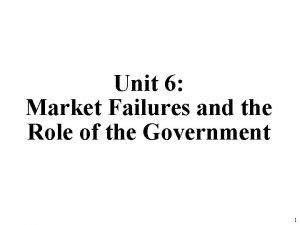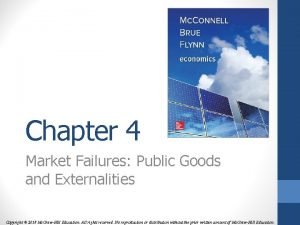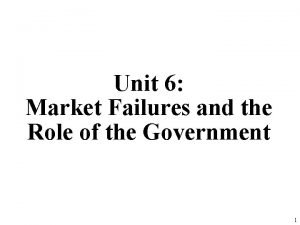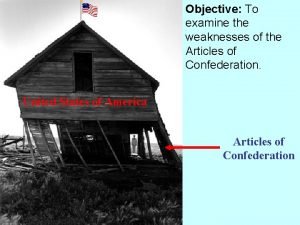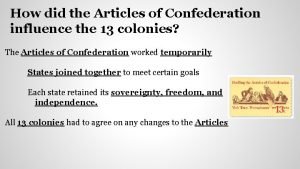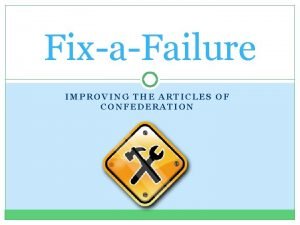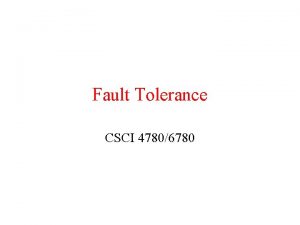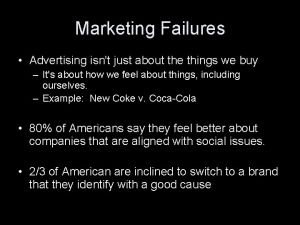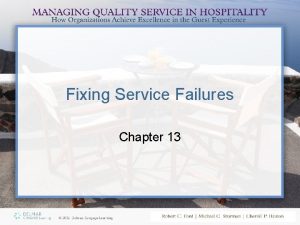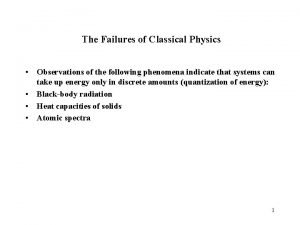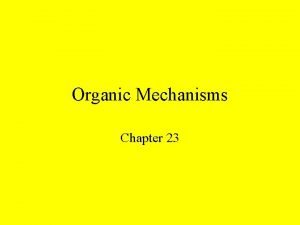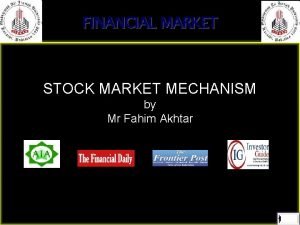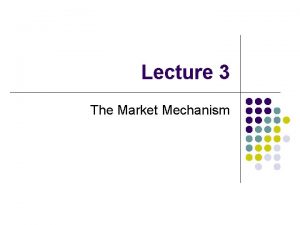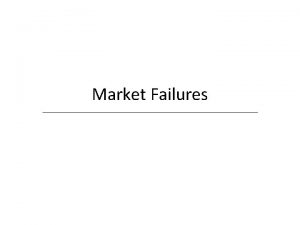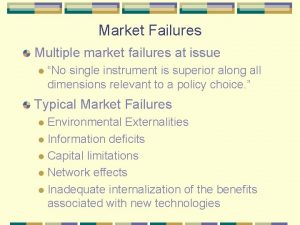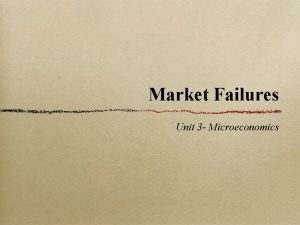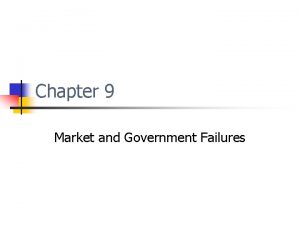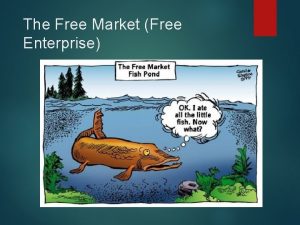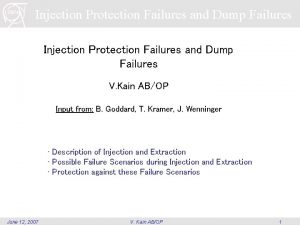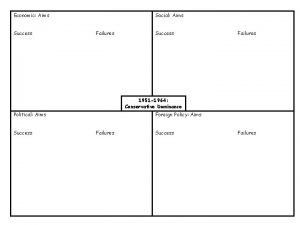Market Failures Definition When the free market mechanism


























- Slides: 26

Market Failures

Definition When the free market mechanism leads to a misallocation of resources in the economy, either completely failing to provide a good or service or providing the wrong quantity.

Market failure 1. 2. 3. 4. 5. 6. 7. Negative externalities Positive externalities Merit & demerit goods Public goods Monopoly Immobility of the factors of production Unequal distribution of income and wealth

Negative externalities Also regarded as the external cost. When the consumption or production of a good or service causes costs to a third party, where the social cost is greater than the private cost.

Negative externalities 1 Costs that spill over to third parties of a market transaction.

Negative externalities in production Where the social cost of production exceeds the private cost Costs and benefits S 2 (MSC) S 1 (MPC) P 2 E 2 P 1 E 1 The existence of negative externalities in production creates a divergence between the private and social costs of production. The private costs of any action are those incurred by the individual decision maker while the social costs of the corresponding action are ALL the conceivable costs associated with the action. D (MSB) Q 2 Q 1 Quantity Production needs to be reduced.

Negative externalities in consumption Where the social cost of consumption exceeds the private cost Costs and benefits S (MSC) E 1 P 1 D 1 (MPB) P 2 E 2 D 2 (MSB) Q 2 Q 1 Quantity The existence of negative externalities in consumption creates a divergence between the private and social costs of consumption. The private benefits of any action are those incurred by the individual decision maker while the social benefits of the corresponding action are ALL the conceivable benefits associated with the action. Consumption needs to be reduced.

Positive externalities Also regarded as the external benefit. When the consumption or production of a good or service results in a third party benefit, where the social benefit is greater than the private benefit.

Positive externalities 2 Benefits that spill over to third parties of a market transaction.

Positive externalities in production Where the social benefit of production is greater than the private benefit Costs and benefits S 1 (MPC) P 1 S 2 (MSC) E 1 P 2 E 2 The existence of positive externalities in production creates a divergence between the private and social costs of production. The private costs of any action are those incurred by the individual decision maker while the social costs of the corresponding action are ALL the conceivable costs associated with the action. D (MSB) Q 1 Q 2 Quantity Production needs to be increased.

Positive externalities in consumption Where the social benefit of consumption is greater than the private benefit Costs and benefits S (MSC) E 2 P 1 E 1 D 2 (MSB) The existence of positive externalities in consumption creates a divergence between the private and social costs of consumption. The private benefits of any action are those incurred by the individual decision maker while the social benefits of the corresponding action are ALL the conceivable benefits associated with the action. D 1 (MPB) QDS 1 QDS 2 Quantity Consumption needs to be increased

Information failure 3 Imperfect information meaning merit goods are underproduced while demerit goods are over-produced or over consumed.

Merit Goods Definition A good that would be under-consumed in a free market, as individuals do not fully understand the benefits that derived from the consumption of that goods Examples § The NHS § State Education § Public leisure centres § Vaccinations § Public Libraries § Screening for cancer § Eye tests § Dental care

Closing the information gap Costs and benefits S (MSC) • Improved information on healthy living to counter the risk of growing obesity and associated health risks. E 2 P 1 E 1 D 2 (MSB) D 1 (MPB) QDS 1 QDS 2 Quantity • The result being an increase in the take up of activities that improve health and promote the positive externalities that go with its consumption.

Demerit Goods Definition Goods that are typically considered to be ‘bad’ for one. Such goods would be over-consumed in a free market, as it brings less overall benefit to consumers than they realise. In addition to this, consumption may well lead to external costs that are not taken account of. Examples § Alcohol § Cigarettes § Gambling § Drugs § Chocolate ? § Fast foods ? § Fizzy drinks ? § High heeled shoes ?

Closing the information gap Costs and benefits S (MSC) E 1 P 1 D 1 (MPB) P 2 E 2 D 2 (MSB) Q 2 Q 1 Quantity • Improved information on the disbenefits of consumption and greater awareness of the negative consequences to the individual and potential spills over effects to third parties. • The result being a reduction in the consumption of demerit goods to a more socially optimum level.

Public goods 4 The private sector in free markets being unable to supply important pure public goods and quasi public goods profitably to consumers.

Public Goods Definition Examples A good that possess the characteristics of nonexcludability and nonrivalry in consumption. Street lighting § National defence § Flood defence systems Non-excludability : - when a good or service is offered for consumption, it cannot be confined to those who have actually paid. Non-rivalry : - consumption by one does not reduce the amount available for others to consume. https: //www. youtube. com/watch? v=E 1 v 5 e. Rs 0_fw § Quasi public goods These do not fully possess the characteristics of nonexcludability and non-rivalry in consumption. As such there may be partial restriction and some form of charging, e. g. national parks.

Public Goods: Filling missing markets Price S 1 P 1 D 1 QDS 1 Quantity As the private sector in free markets will not be able to supply these important services, it is left to the state sector to fill the ‘missing market’ supply.

Monopoly as market failure 5 Market dominance by monopolies can lead to under production and higher prices than would exist under market conditions

Monopolies and price determination Price S 1 P 2 P 1 D 1 QS 1 QD 1 Quantity Monopolists can set supply below that demanded. The resultant excess demand causes price to rise. Alternatively, the lack of competition provides no incentive for the monopolists to be (productively) efficient, and inefficiencies will be passed onto consumers in the form of higher prices. In both instances the higher prices result in a loss in economic welfare.

Positive externalities in production Where the social benefit of production is greater than the private benefit Costs and benefits S 1 (MPC) P 1 S 2 (MSC) E 1 P 2 E 2 The existence of positive externalities in production creates a divergence between the private and social costs of production. The private costs of any action are those incurred by the individual decision maker while the social costs of the corresponding action are ALL the conceivable costs associated with the action. D (MSB) Q 1 Q 2 Quantity Production needs to be increased.

Immobility of the factors of production 6 Immobility of the factors of production causes unemployment and therefore productive inefficiency.

Immobility of labour and the PPB § Consumer goods A O § Occupational immobility of labour. Where there exists a mismatch between the jobs available and the skills of those unemployed or seeking new opportunities. X D § C Points inside the PPB indicate some resources are not being used (fully utilised). B Capital goods Geographical immobility of labour. Where there is a mismatch between vacancies and the location of those able to take up these opportunities, furthermore workers are unable to move due to reasons from family ties to housing costs.

Unequal distribution of income and wealth 7 § Equity or fairness (not to be confused with equality), argues that markets that generate an ‘unacceptable’ distribution of income and therefore social exclusion provide for an allocation of resources that do not maximise economic welfare. § High inequality is associated with a range of social consequences including crime and other negative externalities that flow from criminal activity.

Positive externalities in consumption Where the social benefit of consumption is greater than the private benefit Costs and benefits S (MSC) E 2 P 1 E 1 D 2 (MSB) The existence of positive externalities in consumption creates a divergence between the private and social costs of consumption. The private benefits of any action are those incurred by the individual decision maker while the social benefits of the corresponding action are ALL the conceivable benefits associated with the action. D 1 (MPB) QDS 1 QDS 2 Quantity Consumption needs to be increased
 Guided reading chapter 7 section 1
Guided reading chapter 7 section 1 Unit 6 market failures and the role of the government
Unit 6 market failures and the role of the government Define market failures
Define market failures Supply-side market failures occur when:
Supply-side market failures occur when: Unit 6 four market failures
Unit 6 four market failures Perfect competition examples pictures
Perfect competition examples pictures Types of market failure
Types of market failure Articles of confederation fail
Articles of confederation fail Engineering ethics failures
Engineering ethics failures Pitot static failures
Pitot static failures Articles of confederation fail
Articles of confederation fail Problems with articles of confederation
Problems with articles of confederation Rpc semantics in the presence of failures
Rpc semantics in the presence of failures Aneroid wafer
Aneroid wafer Cloud security failures
Cloud security failures Kublai khan failures
Kublai khan failures Puffery advertising examples in india
Puffery advertising examples in india Fixing service failures
Fixing service failures Failures of classical physics
Failures of classical physics No more failures
No more failures Joseph stalin main accomplishments
Joseph stalin main accomplishments Structured data vs unstructured
Structured data vs unstructured Free radical mechanism
Free radical mechanism Leader challenger follower
Leader challenger follower Positioning and targeting
Positioning and targeting Stock market mechanism
Stock market mechanism Price mechanism example
Price mechanism example

